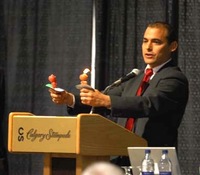Q&A With the Yes Men's Andy Bichlbaum
 The Yes Men,
a corporate ethics activist group, have become famous for impersonating
company officials and delivering satirical pronouncements about
industry practices and policies. Their latest target
was the Gas and Oil Exposition 2007 in Calgary, Alberta, where Yes Men
members Brian Bonanno and Andy Bichlbaum impersonated industry
officials and announced a plan to turn human flesh into fuel. Wired
Science talked with Bichlbaum today.
The Yes Men,
a corporate ethics activist group, have become famous for impersonating
company officials and delivering satirical pronouncements about
industry practices and policies. Their latest target
was the Gas and Oil Exposition 2007 in Calgary, Alberta, where Yes Men
members Brian Bonanno and Andy Bichlbaum impersonated industry
officials and announced a plan to turn human flesh into fuel. Wired
Science talked with Bichlbaum today.
Wired Science: Is there a cut-and-dry message that you were trying to get across?
Andy Bichlbaum:
Billions and billions of dollars are being spent on technologies to
extract fuel in dirty ways. The fuel itself dirty, and the billions
that are being spent could be spent on wind and solar power, which are
clean and don't involve much environmental degradation at all. Why is
this? Because there's no governments forcing them to do that. In fact,
they're doing the opposite -- governments are giving the oil companies
all the tax breaks in the world.
WS: A friend of mine grew up on a ranch in a small town in Alberta. Her family didn't have much money; her mother was a hairdresser, but got a job working for one of the oil companies and is now affluent beyond what she ever imagined. What would you say to her?
Bichlbaum: I wouldn't blame her at all. We're not saying, don't take what's given to you; we're saying that, collectively, we have to decide where we're going to go. I as a consumer, for example, to say I'm never going to fly in an airplane again, or only twice a year, or that I'm never going to eat meat -- that's hard. Maybe for others it's easier, but for many of us it's not easy to make these decisions. But many of us who have trouble doing this on a daily basis could vote for doing this on a sustained way through government. Our power is political. That's why we have democracy.
WS: Some people would say that antagonizing companies like Exxon is counterproductive, since they're going to have to have a seat at the table too if we're going to solve these problems.
Bichlbaum: That's total f*#&ing bu!%$*it. When you're talking about Shell or BP or Exxon or any of these oil companies, it's all they do. They can pretend to do better, or not do a little better -- that's the difference between Shell and Exxon. One's as bad as the other. Shell acts all nice, pretends to be better, funds wind research and solar research, and Exxon doesn't -- but they're doing the same thing. They're pumping billions into research on how to extract oil. You don't engage in a dialogue with them. If you do, it's like treading water. Like giving a popsicle stick to a drowning person, saying this will help a little bit, and what we need is a raft, a boat, a way to stem the tide of corporate greed, and that's only going to happen through sustained political will .
The sort of tactics that overthrew British colonialism are the tactics we need today.
WS: You're calling for physical violence?
Bichlbaum: No, I meant British colonialism in India! That's nonviolence.
WS: There's a lot of debate over whether climate scientists should become more politically active. Do you think they should?
Bichlbaum: Scientists depend on doubt, on not knowing for sure until a certain point. It's part of the language of science to say that this may be true, almost surely is true, but there is always doubt, and you keep your mind open to the unlikely chance that maybe it's not right.
Good science and good political activism aren't necessarily the same thing. I think scientists do tend to have strong political opinions, but they can't express them as scientists in the way that they'd be effective as politics.
There's so many devious forces out there that take advantage of the way that scientists have to express themselves. In fact, all the articles published about climate change agree that it's happening and is grave, but there are a couple of authentic scientists who doubt, so it's presented as a debate -- and the ones who believe strongly that it's happening will never say there's no doubt, because that's not scientific, and the PR companies take advantage of that and cast it for their clients as real doubt, in the conventional nonscientific sense.
WS: So you're saying it's the job of scientists to produce facts, and of journalists to present them sensibly?
Bichlbaum: I absolutely think so. It's the journalists' role. Scientists should present facts, but journalists must distinguish between them.



Small problem with the last bit -- facts don't sell newspapers. We all know this is why journalism can't be trusted anymore. Corporate greed? How about media greed?
We live in an age where we can't trust the government, can't trust our employers, and can't trust journalists either -- so what are we really to do?